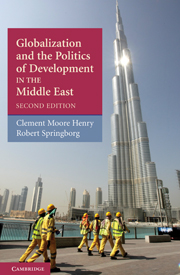Book contents
- Frontmatter
- Contents
- Figures
- Tables
- Preface to the second edition
- Preface and acknowledgments
- Glossary
- Map The Middle East and North Africa
- 1 The globalization dialectic
- 2 The challenges of globalization
- 3 Political capacities and local capital
- 4 Bunker states
- 5 Bully praetorian states
- 6 Globalizing monarchies
- 7 Precarious democracies
- 8 Conclusion
- References
- Index
6 - Globalizing monarchies
Published online by Cambridge University Press: 05 June 2012
- Frontmatter
- Contents
- Figures
- Tables
- Preface to the second edition
- Preface and acknowledgments
- Glossary
- Map The Middle East and North Africa
- 1 The globalization dialectic
- 2 The challenges of globalization
- 3 Political capacities and local capital
- 4 Bunker states
- 5 Bully praetorian states
- 6 Globalizing monarchies
- 7 Precarious democracies
- 8 Conclusion
- References
- Index
Summary
The monarchies in the region are better positioned than praetorian republics to take advantage of the opportunities of globalization. They have more active private sectors, some of which have joint ventures and other constructive relationships with multinational companies, in petroleum-related industries for the most part. Many of them also have concentrated financial systems, discussed in Chapter 3, that enable them to engage in a controlled liberalization consonant with the Washington Consensus. However, the monarchies are also politically more vulnerable than the praetorians because they did not undergo the full political transformation of a colonial dialectic. And they depend almost as much as the other regimes discussed so far in this book on their military and police forces to stay in power – rather than on any deeply rooted traditional legitimacy to which their official propaganda machines lay claim.
Most of them are relics of British imperialism. Britain generally preferred to intervene as little as possible in the internal affairs of these possessions because their prime importance lay in their geographical positions, astride passages to India, not in any intrinsic worth. It was easier to deal with ruling families by anointing them as monarchs than to reorganize their territories as crown colonies. Borders were matters of chance and political opportunity. As colonial secretary in 1921, for instance, Winston Churchill invented Jordan for the sake of one of the sons of the Sharif Hussein of Mecca. The father was owed favors for sponsoring T. E. Lawrence's Arab Revolt against the Turks in World War I. Abdullah, the son in question, had been promised Iraq, but the British gave this plum instead to his younger and more cosmopolitan brother Faisal, who became “available” after the French expelled him from Syria in 1920. The British protected other ruling families, the Sabahs of Kuwait, the Khalifas of Bahrain, the Thanis of Qatar, and the Qabbous of Oman, as well as other tribal notables along the Arabian coastline of the Persian Gulf, helping them to assume the trappings of monarchy and to limit the field of Saudi expansion. Only Morocco's ruling dynasty has roots in the precolonial past, whereas Saudi Arabia, defined by the conquests of its ruling family, only fully emerged with defined borders in the early 1930s. Despite receiving British subsidies, the Saud family retained its independence first by winning the holy lands of Mecca and Medina in 1926 and then by offering oil concessions to the Americans.
- Type
- Chapter
- Information
- Globalization and the Politics of Development in the Middle East , pp. 212 - 260Publisher: Cambridge University PressPrint publication year: 2010



